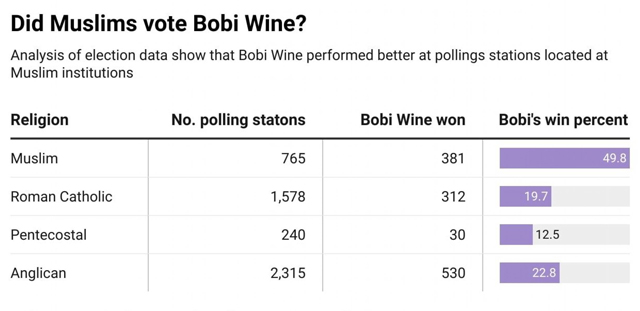
Kampala, Uganda | THE INDEPENDENT | The National Unity Platform -NUP presidential candidate Robert Kyagulanyi aka Bobi Wine scored above 50 percent at 381 of 765 polling stations that were situated at Muslim institutions.
Bobi Wine’s win at these polling stations was 49.8 percent on average.
This is according to analysis of how President Museveni and Bobi Wine scored at polling stations that were situated at religion-affiliated institutions.
It’s not the same pattern that emerges from polling stations that were situated at other religious institutions such as Catholic, Anglican, Pentecostal churches, among others.
And from half a dozen interviews, only Hajji Nsereko Mutumba, the former spokesperson of Uganda Muslim Supreme Council argues that the pattern indicates that Muslims didn’t prefer NRM to NUP. Others say a polling station being situated at a Muslim institution does not mean that majority voters of those communities are Muslim. There is no data that can help answer this question.
Mutumba, in an interview argued that Muslims are marginalized in government political and public service appointments. It’s an argument that has been made for a long time. But perhaps Mutumba makes it better with data: out of 140 presidential advisors, he says only three are Muslims. He had a list when URN interviewed him.
Of the more than 80 ministers, Mutumba only argues that two can be said to be Muslims: State Minister for Microfinance Haruna Kasolo and recently appointed State Minister for Elderly and Disability Sarah Kanyike. For Second Deputy Prime Minister Moses Ali, he says his position was negotiated while Internal Affairs Minister Jjeje Odongo is a Museveni colleague who was with him in the bush.
Isabella Soi of University of Cagliari in a 2016 paper titled; The Muslim Minority in Uganda: The Historical Quest for Unity and Inclusion argued that “even though their (Muslims) relationship with central government has changed during the past 150 years, the feeling of marginalization has proved persistent.”
Soi says many Muslims are cognizant of the marginalization issue. Muslim community, she says have used a number of strategies such as better and higher education levels to achieve “outstanding positions in state management and politics.”
The Muslim clerics who Museveni often meets, Mutumba says, deal with theological matters. Mutumba argues that clerics have no leverage over how people vote: “When he meets the muftis, he says, now, I am okay. But people have independent minds. Can a mufti force me to elect someone? No.”
Few prominent Muslims in government positions, he argues leaves a weak link between the two groups. Mutumba acknowledged that his argument is a bit sectarian but he argued it’s the truth.
There is no data that can correlate religion and voting patterns. For instance, Yumbe district which had the highest number of polling stations 57 out of 335 situated at Muslim institutions was won by Museveni with 71 percent while Bobi Wine polled 23 percent. Its followed by Bugiri with 56 out 371 polling stations located at Muslim institutions. Bobi Wine won Bugiri with 49.68 percent while Museveni polled 46.17 percent.
The Uganda Bureau of Statistics 2014 census statistics did not give religious composition per district. Muslims make up 14 percent of Uganda’s population, Roman Catholics 39 percent, Anglicans 32 percent and Pentecostal Christians 11 percent.
Imam Idi Kasozi says Muslims were not voting any Muslim because none of the candidates in the presidential election was a Muslim.
“People were not voting because of faith. They were voting based on issues that affect them,” he says.
Dr. Jimmy Spire Ssentongo, a social critic, argues that it’s not necessarily an indicator that when majority at a polling station at Mosque vote for Bobi Wine, Muslims have voted for Bobi Wine. He says there are many polling stations at mosques where majority voters are not Muslims.
At other institutions
Bobi Wine polled above 50 percent at 312 of 1578 polling stations that were located at Roman Catholic Churches and schools, 30 of 240 polling stations that were at Pentecostal institutions and 530 of 2315 polling stations that were located at Anglican institutions.
********
URN
 The Independent Uganda: You get the Truth we Pay the Price
The Independent Uganda: You get the Truth we Pay the Price





